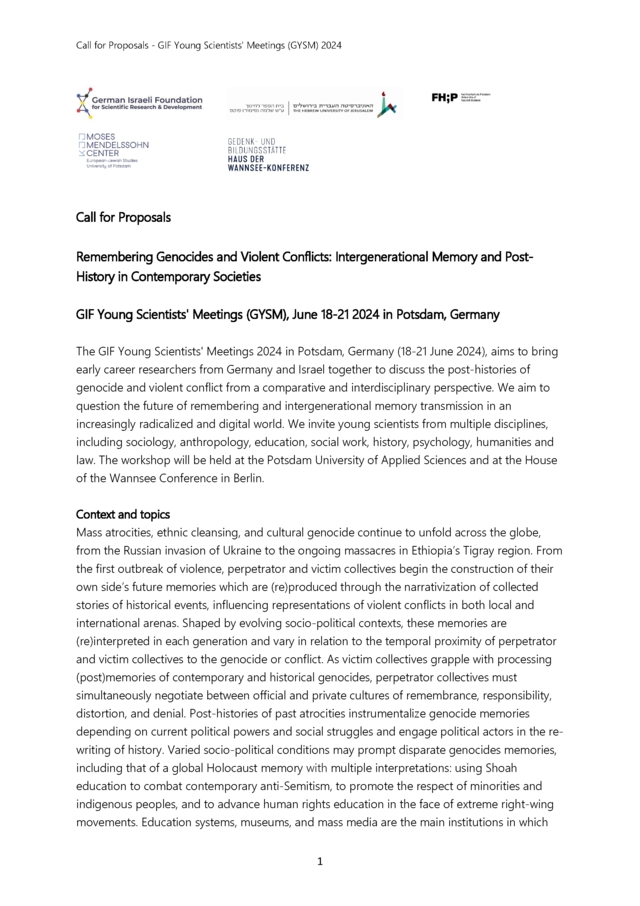- Willkommen
- Aktuelles
- Meldungen
- 2023
- Call for Proposals: Remembering Genocides and Violent Conflicts: Intergenerational Memory and Post-History in Contemporary Societies
- Veranstaltungen
- Meldungen
- Neue Folge des Podcast „Jüdische Geschichte Kompakt“: Weihnukka Spezial 2025
- Hilde Robinsohn-Guest Fellowship für europäisch-jüdische Studien am Moses Mendelssohn Zentrum (1-4 Monate)
- Das MMZ trauert um Micha Brumlik
- Launch der Website Geschichte[n] der deutsch-jüdischen Diaspora
- Newsletter
- Debatten
- Archiv
Call for Proposals: Remembering Genocides and Violent Conflicts: Intergenerational Memory and Post-History in Contemporary Societies
GIF Young Scientists’ Meetings (GYSM), June 18-21 2024 in Potsdam, Germany
The GIF Young Scientists' Meetings 2024 in Potsdam, Germany (18-21 June 2024), aims to bring early career researchers from Germany and Israel together to discuss the post-histories of genocide and violent conflict from a comparative and interdisciplinary perspective. We aim to question the future of remembering and intergenerational memory transmission in an increasingly radicalized and digital world. We invite young scientists from multiple disciplines, including sociology, anthropology, education, social work, history, psychology, humanities and law. The workshop will be held at the Potsdam University of Applied Sciences and at the House of the Wannsee Conference in Berlin.
Context and topics
Mass atrocities, ethnic cleansing, and cultural genocide continue to unfold across the globe, from the Russian invasion of Ukraine to the ongoing massacres in Ethiopia’s Tigray region. From the first outbreak of violence, perpetrator and victim collectives begin the construction of their own side’s future memories which are (re)produced through the narrativization of collected stories of historical events, influencing representations of violent conflicts in both local and international arenas. Shaped by evolving socio-political contexts, these memories are (re)interpreted in each generation and vary in relation to the temporal proximity of perpetrator and victim collectives to the genocide or conflict. As victim collectives grapple with processing (post)memories of contemporary and historical genocides, perpetrator collectives must simultaneously negotiate between official and private cultures of remembrance, responsibility, distortion, and denial. Post-histories of past atrocities instrumentalize genocide memories depending on current political powers and social struggles and engage political actors in the re-writing of history. Varied socio-political conditions may prompt disparate genocides memories, including that of a global Holocaust memory with multiple interpretations: using Shoah education to combat contemporary anti-Semitism, to promote the respect of minorities and indigenous peoples, and to advance human rights education in the face of extreme right-wing movements. Education systems, museums, and mass media are the main institutions in which the discourses and practices of remembering violent conflicts are negotiated and/or reimagined, with social media playing an increasingly influential role in local and global debates around intergenerational memories.
Early career researchers from diverse fields including (but not limited to) anthropology, conflict studies, cultural studies, education, history, international relations, museum studies, political science, psychology, religious studies, social work, and sociology, will be invited to present research which relates to the following topics:
1. The dynamics of intergenerational memory transfer of past and contemporary genocide and violent conflict (including, but not limited to, the Holocaust, Armenian, Bosnian, Rwandan, and Darfur genocides).
2. Post-histories of violent conflict and how they reflect contemporary socio-political and temporospatial contexts (including, but not limited to, the Palestinian-Israeli conflict, civil war in Spain, state terror in Argentina and Chile, the Nagorno-Karabakh conflict).
3. The linking of historical genocides and their postmemories with contemporary conflicts and cultural genocides.
4. The dynamics and discourses of perpetrator-victim relationships, including issues of compensation and political support.
5. Politics of memory in education systems, including how lessons of genocide and violent conflict have transformed in light of changing socio-political contexts, and how educators deal with emotional heritage in the classroom.
6. Remembering in museums and memorials dedicated to genocides and violent conflicts, and their evolving content, meanings, and lessons.
7. Intergenerational memory and the media, including how discourses and representations of genocides and violent conflict have evolved over time, and the influence of new technologies, social media, and “fake news.”
Organizers
Prof. Dr. Julia Resnik and Lance Levenson (The Hebrew University of Jerusalem)
Prof. Dr. Friederike Lorenz-Sinai (Potsdam University of Applied Sciences)
Cooperation partners: House of the Wannsee Conference and the Moses Mendelsohn Center (MMZ) at the University of Potsdam.
Conditions
GIF (German Israel Foundation for Scientific Research and Development) will cover travel costs to the GYSM and (if desired) hotel accommodation for three nights in Potsdam.
Who can apply?
The GYSM is aimed at young scientists from German or Israeli institutions. Postdoctoral researchers, as well as PhD students or researchers who are involved in relevant research projects, are invited to submit proposals. The working language of the workshop will be English.
Application process
Applicants are requested to send an abstract in English (maximum 500 words) explaining how their proposal addresses the theme of the GYSM as outlined above, as well as a short CV (maximum 2 pages), by December 20, 2023 to Prof. Julia Resnik at julia.resnik@mail.huji.ac.il.
Successful applicants will be notified by January 20, 2024. Please feel free to contact us if you have any questions about the application or the conference at julia.resnik@mail.huji.ac.il.
